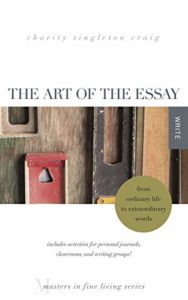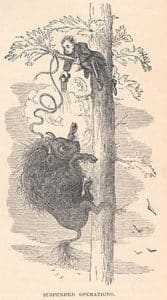I’ve found a new resource for fiction writers and poets.
In The Art of the Essay: From Ordinary Life to Extraordinary Words, Charity Singleton Craig quotes Wendell Berry on writing. Berry is a poet, essayist, novelist, speaker, and, some would say, philosopher. I’ve read his poetry, several of his novels and short stories, and many of his articles, especially those on agriculture and farming. Throughout all of his writing, Berry is consistent, articulating a worldview of community and faith, redemption and restoration.
Craig highlights Berry’s concerns about the loss of meaningful language, citing “Standing by Words,” an essay he wrote back in 1979. Berry argues that a loss of meaningful language parallels the disintegration of community, and the only way to restore language is to choose words from “community speech.” Part of that restoration process is to “dismiss generalities because rarely is something all bad or all good.”

Still, Berry is right, and he’s also right to point out, as Craig notes, that we writers are accountable for our language, and we must stand by it. It’s that important.
That idea is relatively easy to illustrate in nonfiction—essays, articles, reviews, and editorial opinions. Nonfiction can be much like human conversation. It seems straightforward, factual, likely buttressed by evidence, facts, examples, and statistics.When stories are included, though, nonfiction moves more toward creative writing; stories may well be the bridge between nonfiction on the one hand and fiction and poetry on the other. I admit I may be more sensitive to this because of my career as a corporate speechwriter; speeches are essentially rhetorical arguments (nonfiction), but they depend heavily upon stories.

The buffalo climbs the tree in “Roughing It”
How a story is told can be just as important as the story’s point. Mark Twain knew that lesson well. For one example, read “The Buffalo That Climbed a Tree” from Roughing It. It’s a story that must be made up, but it illustrates a truth about the culture Twain was describing and the culture he was writing for.
So how do poets and novelists make themselves accountable for their words, as Berry maintains and Craig highlights? It’s less obvious in poetry and fiction than in nonfiction, but I would argue it’s just as important.
I’ve written one nonfiction book, four novels with another in progress, and likely hundreds if not thousands of poems. I’ve learned accountability through the experience of writing, and I use a set of questions, especially for fiction.
Is the writing clear? Is it credible or believable? Am I using three words when one will suffice? Is this something this character would actually do? Does this scene illustrate the larger whole of the story? Do I provide a map for the reader to follow, or do I lose the reader in the forest? Do I tell when I should show, and when should I tell instead of show? Does this story work best in the voice I’ve written it, or would it be better in another voice? Have I eliminated the unnecessary? And does what I’ve written matter?
These questions happen to track closely to the points Craig is making in The Art of the Essay. In some cases, they’re almost identical. I believe Craig would agree that good essays, novels, poems, novellas, short stories, and articles share common characteristics. And they be more alike than different.
The Art of the Essay isn’t just for essayists. It’s for all writers who care about their work, stand by their work, and hold themselves accountable for their work. That includes fiction writers.
Related:
“The Art of the Essay” by Charity Singleton Craig
Poets and Poems: Wendell Berry and “This Day”
Poets and Poems: Wendell Berry and “Terrapin”
Photo by Lee Cullivan, Creative Commons, via Flickr. Post by Glynn Young.
__________________________

“I require all our incoming poetry students—in the MFA I direct—to buy and read this book.”
—Jeanetta Calhoun Mish
- Poets and Poems: Avraham Stern and “A Soldier and a Poet” - July 15, 2025
- Poets and Poems: Beth Copeland and “I Ask the Mountain to Heal My Heart” - July 10, 2025
- A.E. Stallings: the Parthenon Marbles, Poets, and Artists - July 8, 2025

Mary Sayler says
Love the poems and writings of Wendell Berry! If I had to recommend only one poet for Christian poets and writers to study and enjoy, it would be his work. Thanks, Glynn.